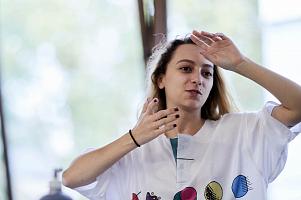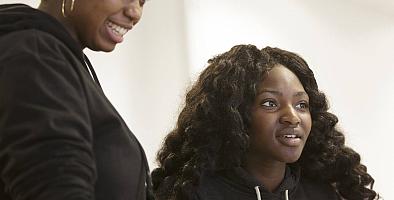BA (Hons) Applied Psychosocial & Psychotherapy Studies
Content navigation menu
Why study BA Applied Psychosocial & Psychotherapy Studies at Goldsmiths
A multidisciplinary degree where you are taught counselling and psychotherapy practices but also learn about the social and cultural contexts of their production.
- This is an innovative multidisciplinary degree, concerned with the interrelationship between self, psyche and society. It promotes a psychosocial framework of understanding the interconnections between the personal and the social, inner and outer worlds, as well as the social conditions to mental health.
- You will be equipped with skills and a critical understanding to work in the mental health field but also in educational, therapeutic and other settings that engage with vulnerable and marginalised individuals and groups.
- The degree will be of great relevance to those who wish to undertake further theoretical studies or formal clinical training as counsellors and/or psychotherapists.
- You'll be taught by a highly experienced team of academics, therapists and counsellors.
- You'll develop your understanding of counselling and therapy practices, and their social and cultural contexts.
- We place great importance on your unique life experiences and personal qualities, and encourage you to continuously question your values in relation to what you are learning.
- We'll encourage you to develop your imagination, creativity and risk-taking ability, and will promote the importance of challenging orthodoxy.
- As well as the counselling and psychotherapy fields, your optional modules will allow you to explore other areas of practice including education, youth justice and social change.
- We're committed to widening participation and life-long learning.
- Our diverse mix of students helps create an inventive and stimulating environment.
Contact
If you have specific questions about the degree, contact Chloe Maslin.
UCAS code
BL93
Entry requirements
A-level: CCC
BTEC: DMM
IB: 27 points overall with three HL subjects at 555
Length
3 years full-time or up to 6 years part-time
Fees
Home - full-time: £TBC
Home - part-time: £TBC
International - full-time: £22000
School
Subject
Watch videos about this course
What you'll study
In the first year you take the following modules:
| Module title | Credits |
|---|---|
| Contemporary Approaches to the Theory and Practice of Psychotherapy and Counselling | 30 credits |
| Theories of Individual Development | 30 credits |
| Culture and Identity | 30 credits |
| Identity, Agency & Environment 1 | 15 credits |
| Identity, Agency & Environment 2 | 15 credits |
Note about optional modules (if available): The above is indicative of the typical modules offered, but is not intended to be construed or relied on as a definitive list of what might be available in any given year. The module content and availability is subject to change.
Teaching style
This programme is mainly taught through scheduled learning - a mixture of lectures, seminars and workshops. You’ll also be expected to undertake a significant amount of independent study. This includes carrying out required and additional reading, preparing topics for discussion, and producing essays or project work.
How you'll be assessed
You’ll be assessed through a combination of assignment, presentation, dissertation, placement portfolio, role play, seen exam, unseen exam, reports and log of placement hours.
Entry requirements
We accept the following qualifications:
A-level: CCC
BTEC: DMM
International Baccalaureate: 27 points overall with three HL subjects at 555
Access: Pass with 45 Level 3 credits including 27 Distinctions and a number of merits/passes in subject-specific modules
Scottish qualifications: CCCCC (Higher) or CCD (Advanced Higher)
European Baccalaureate: 75%
Irish Leaving Certificate: H3 H3 H3 H3
If you can't find your qualification here, then please visit our entry requirements page for a list of alternative qualifications.
Alternative qualifications
See our full list of undergraduate entry qualifications.
We welcome applicants from a wide range of backgrounds who either meet standard university entry requirements or can demonstrate appropriate levels of knowledge and skill in a portfolio of entry.
Certification by means of GNVC, Access, NVQ, BTEC, College Foundation Certificate, AS and A-level is accepted, in many subject areas - for example, in Psychology, Cultural Studies, Art, Dance, Social Studies, Drama, Anthropology, Sociology, English, Politics, Media and Communications, History, and Film Studies.
If you believe you may not meet the standard qualification requirements we would still encourage you to apply because we consider all aspects of your application when making a decision.
We’ll pay particularly careful attention to your personal statement, which is your opportunity to demonstrate your interest in the subject you’ve applied for. Your referees are also welcome to include any relevant contextual comments around your academic achievements. We’ll look at all these things when making a decision on your application, as well as your qualifications and grades, and may still be able to offer you a place.
International qualifications
We also accept a wide range of international qualifications. Find out more about the qualifications we accept from around the world.
If English isn’t your first language, you will need an IELTS score (or equivalent English language qualification) of 6.0 with a 6.0 in writing and no element lower than 5.5 to study this programme. If you need assistance with your English language, we offer a range of courses that can help prepare you for degree-level study.
Fees and funding
Annual tuition fees
These are the UG fees for students starting their programme in the 2025/2026 academic year.
- Home - full-time: £TBC
- Home - part-time: £TBC
- International - full-time: £22000
If your fees are not listed here, please check our undergraduate fees guidance or contact the Fees Office, who can also advise you about how to pay your fees.
It’s not currently possible for international students to study part-time if you require a Student Visa, however this is currently being reviewed and will be confirmed in the new year. Please read our visa guidance in the interim for more information. If you think you might be eligible to study part-time while being on another visa type, please contact our Admissions Team for more information.
If you are looking to pay your fees please see our guide to making a payment.
Funding opportunities
We offer a wide range of scholarships and bursaries, and our Careers Service can also offer advice on finding work during your studies. Find out more about funding your studies with us.
Additional costs
In addition to your tuition fees, you'll be responsible for any additional costs associated with your course, such as buying stationery and paying for photocopying. You can find out more about what you need to budget for on our study costs page.
There may also be specific additional costs associated with your programme. This can include things like paying for field trips or specialist materials for your assignments. Please check the programme specification for more information.
Careers
Getting you ready for work
This programme will equip you with the broad range of complex skills and attributes increasingly required by employers, irrespective of whether you decide to proceed to a clinical training in some area of psychotherapy and counselling (eg Art Psychotherapy).
Students graduating from the programme move on to a range of careers and employment areas including the public and voluntary/third sector in the areas of mental health, social care and education.
Many of our graduates do continue to postgraduate degrees in therapies, counselling and education (PGCE), however our graduates could also pursue careers in other caring professions such as social work.
In addition, the literacy, numeracy, communication and practical skills acquired by Psychosocial Studies students are very marketable in other employment fields such as human resources/personnel management.
We has very strong links with therapeutic and community organisations. Students on the degree have an opportunity to gain practical experience in a placement as part of the Fieldwork Practice optional module in Year 3. This experience introduces students to the varied range of organisations, agencies and services relevant to counselling and therapies, allowing students to learn about counselling and therapies practices in the wider community through personal engagement. Students also learn about working within an organisation and will engage in issues of ethical conduct and confidentiality while developing their ability to work as part of a team.
You can find out more about the career paths open to you after graduating on our Social, Therapeutic and Community Studies careers page.
Skills
The programme will enable you to develop the following skills:
- Enhanced skills in literacy, writing and communication, including oral communication skills, the ability to develop and present sustained and persuasive reasoned arguments (both written and oral), presentation skills, note taking and report writing.
- The ability to observe, listen and interact effectively with others, particularly in a group setting. The ability to work with, and in relation to, others from diverse backgrounds.
- Planning, organistaion, time management skills, including the ability to work on your own initiative and meet deadlines thus evidencing personal effectiveness.
- Research skills including information gathering and retrieval, and the ability to synthesise information from a variety of primary and secondary sources.
- The ability to plan, design, manage and complete an independent project.
- Analytical thinking, critical reasoning and problem solving including the ability to be open-minded and form independent judgements.
- An awareness of social, political and cultural processes and an awareness of social and cultural difference.
- An understanding of professional therapeutic culture and practices.
- 'Soft' transferable skills, including the ability to reflect on your own intellectual development, imagination, creativity, the willingness to take risks, and – where necessary – the ability to engage in constructive, informed and critical challenges to orthodoxy and the ability to think ‘outside the box’.
Find out more about we help you improve your employability while at Goldsmiths





